From bank halls to streets: How the CRDB Bank Foundation is reshaping banking landscape
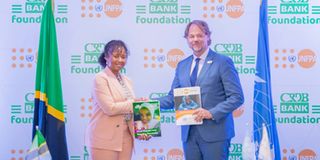
CRDB Bank Foundation Managing Director, Tully Esther Mwambapa (left) with the UNFPA Country Representative, Mark Bryan Schreiner as they signed a memorandum of understanding to empower first-time young mothers.
“I once wanted to open a bank account, but the number of documents I was required to submit discouraged me. I gave up on the idea. But now, I see that you (CRDB Bank) have simplified procedures. With this new approach, you will reach many of us who didn’t previously meet the requirements,” says Lucas Kapimpiti, a resident of Ikola village in Tanganyika District, Rukwa Region.
Ikola village lies over 70 kilometers from Mpanda, the Rukwa regional headquarters where Kapimpiti would have needed to go to open a bank account upon complying with all the necessary requirements.
To complete the process, he would have had to suspend all his daily activities just to secure a bank account for money custody and conduct other crucial transactions for both personal use and his dried fish business.
Kapimpiti’s challenges mirror those of Rosemary Igondi, a small entrepreneur running a women’s hair salon in Chamwino, Dodoma Region. Today, those protracted challenges are now done and dusted after signing up with the IMBEJU programme under CRDB Bank Foundation (CBF).
Kapimpiti benefited from the “Imbeju Jiwezeshe” campaign run by the foundation, while Rosemary was supported through an entrepreneurship and financial literacy training programme for future young mothers co-hosted with the United Nations Population Fund (UNFPA).
At 21, Rosemary says: “I had never set foot in a bank even though I have been raising my five-year-old son. I started fending for myself after getting pregnant in Form Three. At that time, I had no documents to open a bank account, so I just had to keep on hustling.”
Neither Rosemary nor her 37 fellow participants had a bank account. So, the training organizers gave them a hands-on experience by taking them to the CRDB Chamwino branch, where they witnessed real banking operations and were encouraged to start using banking services to boost their small businesses.
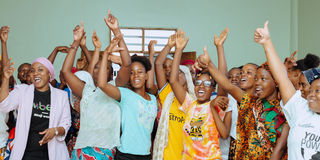
CRDB Bank Foundation Evaluation and Monitoring Officer, Hafsa Msonga (first left) with the first-time young mothers after completing an entrepreneurship and financial capacity-building session provided by the Foundation in collaboration with UNFPA in Bahi District, Dodoma Region.
“19 participants opened Imbeju Accounts, and those without national IDs were assisted by the bank in collaboration with NIDA to fill out the necessary forms. They were so happy. It was captivating to see them enter a bank for the first time in their lives,” says Lolabona Lema, Empowerment Officer for the Imbeju Programme – CRDB Bank Foundation.
After opening her Imbeju account, Rosemary had never bothered going to the bank again only after hearing of the circulating news that multiple attachments were needed to start access the account.
“I used piggy banks for savings or through wallet. Sometimes I would give it to someone I trusted most to keep it for me. But starting today, I’ll be depositing all my savings at the bank. I’m happy to have a bank account now with the CRDB Bank—I feel like a government employee,” she says, laughing with uncontainable joy.
Learning in a friendly environment
CRDB Bank Foundation (CBF) Managing Director, Tully Esther Mwambapa says many Tanzanians lack financial literacy, which is why the foundation has made it a priority to reach people where they are and educate them.
“Life poses multitude challenges that deny people the opportunity to learn essential things like entrepreneurship and financial literacy. Young people facing these challenges in such tender age often focus on survival and never make it to a bank. That’s why we go to them,” Tully Esther explains.
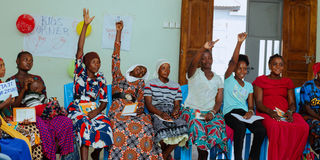
First-time young mothers contributing their ideas to entrepreneurship and financial literacy training provided by the CRDB Bank Foundation in collaboration with the UNFPA in Bahi District, Dodoma Region.
She adds that these challenges affect young people found in markets, mines, lakes, or doing small-scale businesses—places where people earn an honest living but often lack the time or access to open a bank account due to their busy schedules.
Despite the small size of their businesses, women, youth, and special groups targeted by the CRDB Bank still have the potential to grow economically if they receive proper training and formalize their ventures.
“Everyday challenges inspire us to find ways to overcome them. Many Tanzanians don’t use banking services—not because they are unqualified, but because they lack accurate information. CRDB Bank has decided to stop waiting for people to come to us. Through our Foundation, we hit the streets and have them served. This method makes it easier for people to learn in their own communities, surrounded by familiar faces. They understand better and make informed decisions,” emphasizes Tully Esther.
She notes that educating the public on financial literacy and entrepreneurship is a huge task, so the Foundation partners with stakeholders who share similar visions to reach as many people as possible.
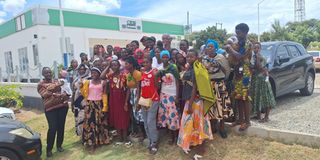
First-time young mothers in Chamwino District, Dodoma Region looking happy when they had paid a visit at the CRDB Bank branch after participating in an entrepreneurship and financial literacy training. The visit gave them the opportunity to enter the bank for the first time.
To support this initiative, Tully Esther mentions partnerships with both local and international entities such as the Ministry of Community Development, Gender, Women, Children and Special Groups, TAMISEMI, the Ministry of Labour, Youth, Employment and Persons with Disabilities, UNFPA, the UN Development Programme (UNDP), the Commission for Science and Technology (COSTECH), the ICT Commission (ICTC), and women’s empowerment groups like Buta Vicoba Endelevu, Mbweni Women (MBWE) Group, and Bunju Women (BWE) Group.
“There are many opportunities that entrepreneurs can tap from. These opportunities exist locally, regionally, and even nationally. We also know Africa now has a free trade area, and Tanzanians should seize those opportunities. Our partners help us unlock these opportunities from the grassroots level to beyond our national borders,” says Tully Esther.
IMBEJU Jiwezeshe – From Bank Halls to Streets
Fadhil Bushagama, Head of Startups and Inclusive Growth at CRDB Bank Foundation says that they have made significant efforts to reach every Tanzanian and equip them with the knowledge they need to grow their businesses and manage their finances.
To achieve this, the Foundation is conducting training in various regions through its experts, who travel extensively. This outreach campaign began in August 2024 in the Southern Highlands, Southern Zone, Dar es Salaam Zone, and currently the Lake Zone.
“In the beginning, we offered training in dedicated venues, but we realized we needed to directly hit the streets to reach more unbanked people. Now, we meet them at markets or bus stands. We speak to them one-on-one at their workplaces. This makes it easier for them to make decisions because they are learning while serving their customers,” says Bushagama, citing Lucas Kapimpiti as an example.
He adds that this new approach gives people who can’t afford to leave their businesses—even briefly—an opportunity to learn and start planning for growth.
“People are always in a rush. In small businesses, often one person does everything. They can’t step away even for two minutes. For example, a street vendor or commercial motorcycle operator can’t leave their work for a one-or two-hour seminar. If they do, they miss out on income. So we meet them where they are, help them open an account, and they can visit the branch later to apply for start-up capital,” he explains.
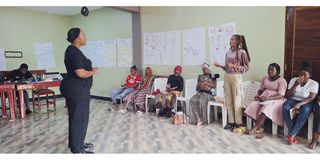
CRDB Bank Foundation Grant Specialist, Lolabona Lema providing entrepreneurship and financial literacy training to first-time mothers in Chamwino District, Dodoma Region to advance youth financial inclusion.
To boost public participation in economic activities, the CBF offers entrepreneurship training to help participants grow their businesses, expand into other sectors, or scale up within their existing field.
Additionally, the Foundation provides financial literacy training to help budding entrepreneurs manage their income—for personal needs, business development, and handling financial challenges.
After this training, those ready can open an Imbeju Account, marking the beginning of having formal financial records. Once they complete these steps, they can apply for seed capital starting from Sh 200 million up to Sh 10 million for women. The limit can go beyond Sh 30 million for youth-led innovative projects certified by COSTECH or ICTC as beneficial to the community.
Since launching the Programme in 2023, the CBF has successfully provided financial literacy and entrepreneurship training to over 800,000 women and youth across the country, and issued approximately Sh 20 billion in seed capital.
This support has been implemented through several sub-programmes under Imbeju, including Imbeju Ng’ara for women, Imbeju Buni for youth start-ups, and Imbeju Kilimo for small-scale farmers.


